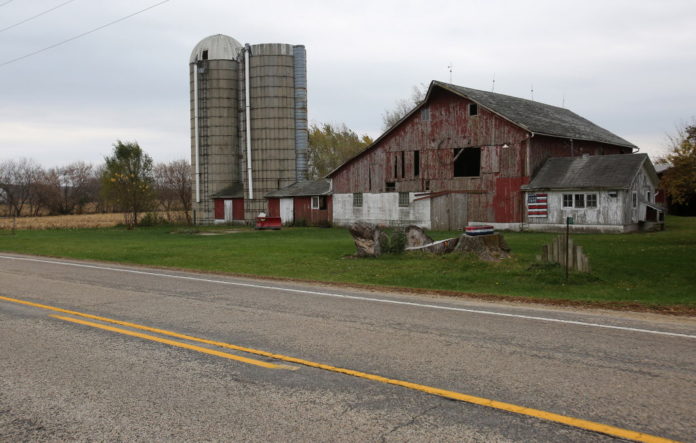For beef and corn producer Cal Dalton, late December and early January was an optimistic time on the farm. Crop and cattle prices were decent, and Dalton felt a renewed energy after an extended downturn from China embargoes.
But then COVID-19 hit.
“It pretty much destroyed our markets,” Dalton told a WisPolitics.com-WisBusiness.com virtual luncheon yesterday. He noted a dollar drop in corn prices, a dollar fifty drop in soybean prices and a twenty dollar hundredweight drop for cattle.
Despite the agricultural markets shattering, Dalton was quick to affirm that farmers remained optimistic and hoped to work themselves out of the economic dilemma brought on by the pandemic. Solutions: shift production and diversify the farm.
“Some producers here in Wisconsin planted more acres of hay this year and we did the same thing on our farm — we went to more soybeans and less corn. And we’re hoping that that was a good combination to diversify our operation and make it a little more profitable,” the Endeavor farmer and ethanol advocate said.
He noted producers nationwide cut corn acres because of the costs to plant and its low profitability, which in turn affected ethanol production.
Dalton, who also serves as president on the United Wisconsin Grain Producers board, said that of the state’s nine ethanol plants, two are closed and several others, including UWGP, are operating at reduced capacity.
“We did get into some hand sanitizer, as well as some of the other plants in the state got into sanitizers… or as we call it the industrial ethanol market, which was actually a little bit of a boost for us,” he said.
Dan Smith, president and CEO of the Cooperative Network was another panelist in the virtual discussion moderated by farm broadcaster Pam Jahnke. Other panelists included: UW-Madison economist Ian Coxhead and Sen. Janis Ringhand, D-Evansville, a member of the Senate agriculture committee.
Smith called for a reinvestment in Wisconsin agriculture — the farm, processing and distribution — to address the industry’s profitability problem.
“For many, many years, we have not had a production problem in agriculture; we’ve had a profitability problem,” he said. “And only until we can address the profitability problem can we have a strong and vibrant agriculture where we’re not losing farm families and rural businesses every year.”
Dalton noted Wisconsin farms are diversifying, doing things like starting a beef herd on a dairy farm or starting agri-businesses like meat processing plants. He says there needs to be more of that kind of thing. Other viable opportunities for farmers to boost profits include using the value of their land for things such as carbon sequestration — growing cover crops to keep carbon dioxide in the soil rather than the atmosphere.
Refinancing land, however, is something Dalton says “we’ve got to get away from.”
Smith pointed out the irony that Wisconsin agriculture is a success story — a $105 billion industry — but noted the trouble in bringing in the next generation. He said it’s hard to transition a business that’s in the red.
“Once we become more profitable, then we’re going to attract younger people back into the business,” said Dalton. “We’re seeing some resurgence, but we’ve got to be able to put some profitability back on the farm if we’re going to continue agriculture here in the future. I don’t care if it’s large farms or small farms.”
Coxhead warned that while the trade agreements with China provide temporary relief coming out of the pandemic, it is just that — temporary.
“On top of trade wars, which hurt Wisconsin families pretty substantially, we’ve got this kind of Band-Aid approach of the Phase 1 trade deal,” he said. “And it’s literally a Band-Aid; it will come off in the bathtub and then we’ll have to be looking for something else to cover up this particular wound.”
Coxhead predicted the U.S. economic recovery is going to be slower than the rest of the world due to the nation’s public health policies. This will matter for Wisconsin as the state has high export exposure. Southeast Asian in particular will have rapid recovery, he said, suggesting countries there will exploit the situation.
Sen. Janis Ringhand, D-Evansville, said that now, profitability and sustainability are the biggest questions. She acknowledged that regulation of supply versus demand wouldn’t be a popular decision among farmers if their production is limited by the government.
“But we have to find a happy medium somewhere,” she said
Ringhand noted that one of the reasons for the Dairy Innovation Hub’s approval was to look deeper into those issues and try to find solutions that work for everyone — “not just the big guys push the little guys out, that’s not sustainable, there’s room for everyone, but we do need to find answers to that profitability measure and that has not been working for the last several years as we all know.”
See the discussion, brought to you by sponsors Wisconsin Biofuels Association, the Wisconsin Farm Bureau and WAGET plus partners WIPPS and the Center for East Asian Studies at UW-Madison: https://youtu.be/RR9hqHOxmUc?t=10
-By Stephanie Hoff
WisBusiness.com






